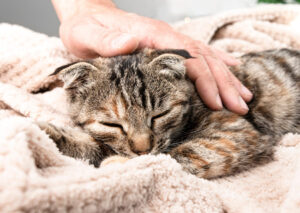
Even the healthiest cats vomit once in a while. However, if your cat is vomiting more frequently than once per week or is showing signs of lethargy, weakness, decreased appetite, blood in the vomit material itself, increased thirst, increased or decreased urination, or simultaneous diarrhea, he or she should be evaluated by one of our veterinarians as soon as possible.
There are many possible reasons why your cat may be vomiting, including:
- Hairballs: Hairballs are a common complaint—and in most cases are a relatively benign cause of feline vomiting. Vomiting hairballs is your cat’s way of disgorging a damp, cylindrical wad of undigested hair, moistened by bile and other digestive fluids (i.e., a “hairball”). It is not uncommon for a cat to expel a hairball once every week or two without any enduring problems. Indeed, a serious complication might occur if a cat does not bring up a hairball occasionally, since a clump of matter that has passed from its stomach into its intestinal tract could cause a life-threatening blockage. Cats groom themselves by licking their fur, which can lead to the ingestion of hair. This can accumulate in their stomach and cause vomiting as they try to expel the hairball.
- Eating too quickly: If your cat eats too fast, they may regurgitate their food. This is common with cats who are competitive eaters or anxious about food.
- Dietary issues: Changes in diet, food intolerances, or eating something inappropriate, such as spoiled food, various human medications, pieces of string or yarn, antifreeze, certain human foods (chocolate or onions, for example), or any number of objects that a cat might find lying about on the floor—paper clips, rubber bands, and the like.
- Gastrointestinal issues: Conditions like obstruction due to ingested foreign objects, constipation, gastritis, inflammatory bowel disease, or pancreatitis can cause chronic vomiting.
- Infections or parasites: Bacterial, viral infections, or intestinal parasites (like worms) can lead to vomiting.
- Toxins: Ingesting toxic substances like household cleaners, leaves from plants (like lilies), or certain human foods can cause vomiting and other severe symptoms.
- Growths: the presence of benign or cancerous gastrointestinal growths can cause your cat to vomit.
- Metabolic Diseases: Chronic vomiting can be a symptom of more serious underlying conditions including a wide range of metabolic diseases including diabetes, kidney disease, and hyperthyroidism, especially in older cats.
- Stress: Cats are sensitive to changes in their environment, such as a new pet, move, or changes in routine, which can lead to stress-induced vomiting.
If your cat’s vomiting is frequent, persistent, or accompanied by other symptoms like lethargy, diarrhea, or weight loss, it’s important to consult one of our veterinarians for a proper diagnosis and treatment.
Diagnosing The Cause of Your Cat’s Vomiting
Diagnosing why your cat is vomiting involves several steps, starting with a thorough exam by one of our veterinarians. Here’s a guide on how to diagnose the cause of your cat’s vomiting:
Thorough Physical Exam By One of Our Veterinarians
Diagnosing the cause of frequent vomiting in cats begins with a thorough physical exam from one of our veterinarians along with the history from the owner. Your observations of the symptoms and your cat’s behavior is important:
- Frequency of vomiting: Is it occasional or frequent?
- Timing: Does it happen right after eating, or at random times?
- Appearance of vomit: Is it undigested food, liquid, hairballs, or bile?
- Additional symptoms: Look for diarrhea, lethargy, loss of appetite, weight loss, or changes in behavior.
- Diet changes: Has your cat’s food changed recently? Some cats are sensitive to new ingredients or brands.
- Speed of eating: Does your cat eat too quickly? Consider feeding smaller meals more frequently.
- Foreign objects or plants: Has your cat ingested something unusual, like plants or non-food items?
- Hairballs: If your cat grooms frequently, it could be vomiting due to hairball formation.
During your cat’s physical exam, we may suggest additional testing to rule out blockages, toxicities, parasites, and metabolic diseases.
- Blood Tests:
A complete blood count (CBC) and biochemistry panel can check for infections, liver/kidney disease, or metabolic issues. - Fecal Exam:
This helps to detect intestinal parasites or infections. - Urinalysis:
This can reveal signs of kidney issues or other underlying problems. - Blood Tests:
A complete blood count (CBC) and biochemistry panel can check for infections, liver/kidney disease, or metabolic issues. - X-rays or Ultrasound:
These imaging tests can check for blockages, foreign objects, or abnormalities in the digestive system. - Endoscopy or Biopsy:
In some cases, we may perform an endoscopy to look inside your cat’s stomach and intestines or take a biopsy to check for conditions like inflammatory bowel disease or cancer. - Allergy or Diet Testing:
If food allergies or intolerances are suspected, we may recommend trying a hypoallergenic or elimination diet.
Treatment Options
Based on your cat’s diagnosis, treatment to stop your cat from vomiting might include:
- Medications: Anti-nausea drugs, dewormers, antibiotics, or anti-inflammatory medication.
- Dietary changes: Switching to a prescription diet or special food to address sensitivities or gastrointestinal issues.
- Surgery: In rare cases, surgery may be needed if there’s a foreign body or serious blockage in the intestines.
Call us today so that we can help you determine the underlying cause of your cat’s vomiting and find the right treatment approach. Remember that if your cat’s vomiting persists, is severe, or is accompanied by other symptoms like weight loss, dehydration, or lethargy, it’s important to call us as soon as possible.

